Book
ISBN: 9780520285279 0520285271 0520285271 Year: 2015 Publisher: Oakland University of California Press
Abstract | Keywords | Export | Availability | Bookmark
 Loading...
Loading...Choose an application
- Reference Manager
- EndNote
- RefWorks (Direct export to RefWorks)
"The compulsion to dwell on history--on how it is recorded, stored, saved, forgotten, narrated, lost, remembered, and made public--has been at the heart of artists' engagement with the photographic medium since the late 1960s. Uncertain Histories considers some of that work, ranging from installations that incorporate vast numbers of personal and vernacular photographs by Christian Boltanski, Dinh Q. Lê, and Gerhard Richter to confrontations with absence in the work of Joel Sternfeld and Ken Gonzales-Day. Projects such as these revolve around a photographic paradox that hinges equally on knowing and not knowing, on definitive proof coupled with uncertainty, on abundance of imagery being met squarely with its own inadequacy. Photography is seen as a fundamentally ambiguous medium that can be evocative of the historical past while at the same time limited in the stories it can convey. Rather than proclaiming definitively what photography is, the work discussed here posits photographs as objects always held in suspension, perpetually oscillating in their ability to tell history. Yet this ultimately leads to a new kind of knowledge production: uncertainty is not a dead end but a generative space for the viewer's engagement with the construction of history"--Provided by publisher.
Photographic criticism --- Photography, Artistic --- Art and history --- History in art --- Historical art --- History and art --- History --- Artistic photography --- Photography --- Photography, Pictorial --- Pictorial photography --- Art --- Photography criticism --- Criticism --- Aesthetics
Book
ISBN: 0262376636 0262376628 0262546833 Year: 2023 Publisher: Cambridge, Massachusetts : The MIT Press,
Abstract | Keywords | Export | Availability | Bookmark
 Loading...
Loading...Choose an application
- Reference Manager
- EndNote
- RefWorks (Direct export to RefWorks)
"Analyzing the transformation of photography by computation - and the transformation of human perception by algorithmically-driven images, from CGI to AI - The Perception Machine brings together media theory and neuroscience to understand what it means to live surrounded by image flows and machine eyes"--
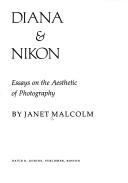
ISBN: 0879232730 9780879232733 0879233877 9780879233877 Year: 1980 Publisher: Boston David R. Godine, Publisher
Abstract | Keywords | Export | Availability | Bookmark
 Loading...
Loading...Choose an application
- Reference Manager
- EndNote
- RefWorks (Direct export to RefWorks)
Artistic photography --- Artistieke fotografie --- Fotografie [Kunst] --- Kunstfotografie --- Photographie artistique --- Photography [Artistic ] --- Photography, Artistic --- -Artistic photography --- Photography --- Photography, Pictorial --- Pictorial photography --- Art --- Addresses, essays, lectures --- Aesthetics --- -Addresses, essays, lectures --- CDL --- 77.01 --- Photographic criticism --- Photography criticism --- Criticism
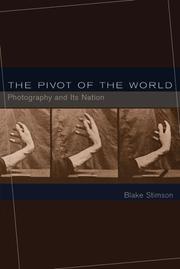
ISBN: 026269333X 9780262693332 Year: 2006 Publisher: Cambridge MIT press
Abstract | Keywords | Export | Availability | Bookmark
 Loading...
Loading...Choose an application
- Reference Manager
- EndNote
- RefWorks (Direct export to RefWorks)
Photographic criticism --- Photography --- Social aspects. --- fotografie --- fotografietheorie --- twintigste eeuw --- seriële fotografie --- fotografie en maatschappij --- Steichen Edward --- Frank Robert --- Becher Bernd --- Becher Hilla --- Becher Bernd & Hilla --- 77.036 --- Photography criticism --- Criticism --- Social aspects --- Photography - Social aspects.
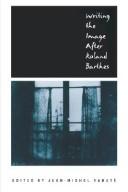
ISBN: 0812215966 9786613210715 1283210711 0812200233 Year: 1997 Publisher: Philadelphia (Pa.): University of Pennsylvania Press
Abstract | Keywords | Export | Availability | Bookmark
 Loading...
Loading...Choose an application
- Reference Manager
- EndNote
- RefWorks (Direct export to RefWorks)
In the final stages of his career, Roland Barthes abandoned his long-standing suspicion of photographic representation to write Camera Lucida, at once an elegy to his dead mother and a treatise on photography. In Writing the Image After Roland Barthes, Jean-Michel Rabaté and nineteen contributors examine the import of Barthes's shifting positions on photography and visual representation and the impact of his work on current developments in cultural studies and theories of the media and popular culture.
Photographic criticism --- Photography --- Philosophy. --- Photography criticism --- Criticism --- Philosophy --- Barthes, Roland --- Criticism and interpretation. --- Barthes, R. --- Барт, Ролан --- Bart, Rolan --- Baruto, Roran --- בארת, רולאן --- بارت، رولان --- ロラン・バルト --- Luolan Bate --- 羅蘭・巴特 --- Cultural Studies. --- Literature.
Book
ISBN: 9780415778558 0415778557 9780415778541 0415778549 9780203153215 9781136521164 9781136521119 9781136521157 Year: 2012 Publisher: London Routledge
Abstract | Keywords | Export | Availability | Bookmark
 Loading...
Loading...Choose an application
- Reference Manager
- EndNote
- RefWorks (Direct export to RefWorks)
"From its inception in the nineteenth century, photography has instigated a series of theoretical debates. In this new text, Jae Emerling therefore argues that the most insightful way to approach the histories of photography is to address simultaneously the key events of photographic history alongside the theoretical discourse that accompanied them. While the nineteenth century is discussed, the central focus of the text is on modern and contemporary photographic theory."--Book cover.
Photographie --- Photographie artistique --- Photographic criticism. --- Photography, Artistic --- Histoire. --- Philosophie. --- History. --- Photographic criticism --- 77.01 --- Photography --- Photography criticism --- Criticism --- 77.01 Fotografie--Semiotiek van de fotografie. Theorie --- Fotografie--Semiotiek van de fotografie. Theorie --- History
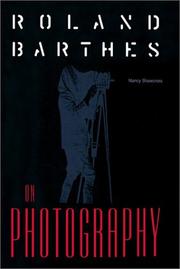
ISBN: 0813023386 9780813023380 0813014697 9780813014692 Year: 1997 Publisher: Gainesville, FL : University Press of Florida,
Abstract | Keywords | Export | Availability | Bookmark
 Loading...
Loading...Choose an application
- Reference Manager
- EndNote
- RefWorks (Direct export to RefWorks)
Photography --- Photographic criticism. --- Photographic criticism --- Visual Arts --- Art, Architecture & Applied Arts --- Photography criticism --- Criticism --- Philosophy. --- Philosophy --- Barthes, Roland. --- Barthes, Roland --- Barthes, R. --- Барт, Ролан --- Bart, Rolan --- Baruto, Roran --- בארת, רולאן --- بارت، رولان --- ロラン・バルト --- Luolan Bate --- 羅蘭・巴特
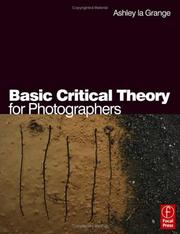
ISBN: 1136090134 1136090142 128075429X 9786610754298 0080468381 9780080468389 9780240516523 0240516524 9781136090141 9781136090097 9781136090134 9781138129573 Year: 2005 Publisher: Oxford ; Burlington, MA : Elsevier Focal Press,
Abstract | Keywords | Export | Availability | Bookmark
 Loading...
Loading...Choose an application
- Reference Manager
- EndNote
- RefWorks (Direct export to RefWorks)
Basic Critical Theory for Photographers generates discussion, thought and practical assignments around key debates in photography. Ashley la Grange avoids the trap of an elitist and purely academic approach to critical theory, taking a dual theoretical and practical approach when considering the issues. Key critical theory texts (such as Sontag's 'On Photography' and Barthes' 'Camera Lucida') are clarified and shortened. La Grange avoids editorilising, letting the arguments develop as the writers had intended; it is the assignments which call into question each writer's approach and promote de
Photographic criticism. --- Photography --- Photography criticism --- Criticism --- Philosophy. --- fotografietheorie --- kunsttheorie --- Berger John --- Shore Stephen --- Szarkowski John --- Sontag Susan --- Rosler Martha --- Solomon-Godeau Abigail --- Scott, Clive --- Grundberg Andy --- Singh Raghubir --- Russell Bertrand --- Calvino Italo --- fotografie --- 77.01
Book
ISBN: 2080126377 9782080126375 Year: 1995 Publisher: Paris Flammarion
Abstract | Keywords | Export | Availability | Bookmark
 Loading...
Loading...Choose an application
- Reference Manager
- EndNote
- RefWorks (Direct export to RefWorks)
La photographie est pour Cartier-Bresson un moyen parmi d'autres d'exercer son intelligence du monde, de créer un "imaginaire d'après nature". Cet "outil" est toujours resté en relation avec sa pratique première de la peinture et du dessin. L'art du tir à l'arc zen, auquel il se réfère, vient insérer la photographie dans un cadre symbolique original qui couronne une réflexion profonde, invalidant les distinctions propres à la culture occidentale entre discipline physique, exercice spirituel et activité artistique. Le photographe-archer devient ainsi maître de l'instant en pratiquant un art sans art. Henri Cartier-Bresson apporte son éthique au reportage, faisant du photographe le Seigneur de l'occasion, le Maître des coïncidences. Puis, les noeuds qu'il a si vivement ourdis avec le temps grâce à l'outil photographique seront patiemment renoués avec le dessin. En présentant au lecteur à la fois les peintures, les dessins et les photographies d'Henri Cartier-Bresson, cet ouvrage propose un regard neuf tant sur son oeuvre que sur l'art des reporters photographes dont il se réclame.
Photographic criticism --- 77.071 CARTIER-BRESSON --- CDL --- Photography --- Photography criticism --- Criticism --- Cartier-Bresson, Henri, --- Bresson, Henri Cartier-, --- Criticism and interpretation. --- Cartier-Bresson, Henri --- Criticism and interpretation --- France --- 790 --- photographie --- kunstenaars --- artistes --- Photographies. --- Critique et interprétation.
Book
ISBN: 3770556259 9783770556250 3846756253 9783846756256 Year: 2014 Publisher: Paderborn : Wilhelm Fink Verlag,
Abstract | Keywords | Export | Availability | Bookmark
 Loading...
Loading...Choose an application
- Reference Manager
- EndNote
- RefWorks (Direct export to RefWorks)
In den letzten Jahrzehnten ist das Interesse für das Melodrama, das einst nur als verfehlte Tragödie oder Kitsch galt, angestiegen. Sowohl in wissenschaftlichen Schriften als auch in künstlerischen Arbeiten wird auf eine Gefühlskultur des Melodramatischen Bezug genommen. Was bedeuten ›Melodrama‹ und ›melodramatisch‹ heute? Trotz seines theaterhistorischen Ursprungs evoziert der Begriff zunächst keine Autoren oder Dramentitel, vielmehr lässt er an Bilder, emotional aufgeladene Situationen und bestimmte Pathos-Gesten denken. Die Studie nimmt in exemplarischen Analysen diese ›Bilder des Gefühls‹ im Wechsel der Medien in den Blick – von ihren Anfängen im 18. Jahrhundert bis zu ihren Zitaten und Re-Figurationen in der zeitgenössischen Performance.
Aktionskunst. --- Das @Melodramatische. --- Film. --- Künste. --- Theater. --- Melodrama. --- Emotions. --- Photographic criticism. --- Theater and society. --- Actors --- Society and theater --- Theater --- Photography --- Photography criticism --- Criticism --- Feelings --- Human emotions --- Passions --- Psychology --- Affect (Psychology) --- Affective neuroscience --- Apathy --- Pathognomy --- Drama --- Dramatic music --- Social status --- Social aspects

 Search
Search Feedback
Feedback About UniCat
About UniCat  Help
Help News
News